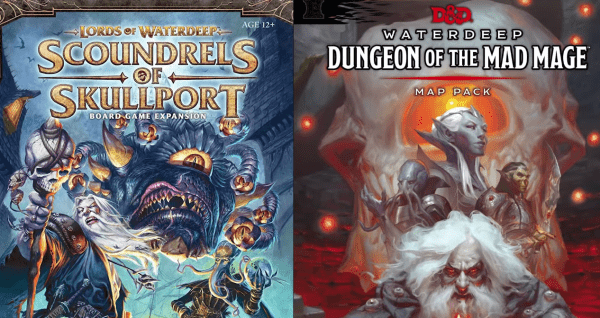A significant part of any campaign resides in the ability checks and saving throws made by players and Dungeon Master-controlled NPCs. Whether through a specific action requiring a check to be made, a spell needs one to determine if extra damage or other effects are triggers or even if a question is asked to the Dungeon Master.
These checks are always used to determine the success of actions and other situations. An equally important part of these checks is the proficiencies layers will have in specific abilities. When building their character, a player will have two of their Ability Scores deemed a proficiency, based on the Class chosen by the player.
These proficiencies will be the subject matter of this list as we go through the top 6 most helpful Ability Score Proficiencies that a player can select. This list is organized from Worst to Best, following the old saying to “save the best for last.”
6. Constitution
Constitution is mainly used to get a character’s Health Pool calculated and determined during character creation and subsequent level-ups. However, in terms of using it for other things, it is rarely ever called upon by a Dungeon Master to make Constitution Saving Throws outside of combat. Similarly to Dexterity, many spells targeting creatures require a Constitution Saving Throw, regardless of who the caster is and the target on either side.

Failing such a saving throw can mean the player takes damage, suffers a Condition that can negatively affect them, or both, and thus is best to succeed in these throws. Outside of that, Con Saves does not happen that often unless a party member or two decides to go out drinking in their free time.
Such activity could warrant a Con save to determine if they remain undeterred from how much alcohol they have consumed or if they keel over from them succumbing to the Strength of the alcohol.
But drinking games are not the only instance of the Constitution Saving throw being rolled. For example, trips with long durations of travel, attempt to remain awake during night watches, and holding one’s breath during a situation... where it is required are all instances in which a Con save could be utilized, should a player decide to make such a choice. However, since players tend not to do such a thing unless required, the Constitution Save is reserved for Combat situations and Health Pool Calculations only.
5. Strength
Strength Checks are the first ones on the list that have uses both within and outside of combat encounters, as Constitution is the only one that suffers from such a fate. Strength helps determine a character’s physical power during specific tasks that may require the check, such as jumping a giant chasm or climbing a wall, via the Athletics Ability.
However, Strength also determines a key component in battle situations, as a part of one’sone’s melee attack bonus is determined by their Strength Modifier, added in with their Proficiency Bonus and other modifiers that may be prevalent to the weapon in hand. The Strength Ability score could also be called to make a saving throw should the player choose to do something requiring their Strength.
Such as ripping a door off its hinges, lifting a large object like a boulder, or physically breaking free of bonds that restrain the player.
Such rolls aren’t the only thing that Strength Ability Scores affect. However, the Strength score also determines the number of items a player can carry before they are considered Over-Encumbered, should the Dungeon Master running the game require Encumbrance to be a factor.
Since there are not that many Dungeon Masters that use Encumbrance as a variant rule, this part of the Strength Ability Score is mainly ignored, but overall, Strength can be helpful in situations where it is needed.

4. Dexterity
There are a variety of things concerning combat encounters that Dexterity applies to in a very similar light to the Strength Ability Score. However, more things can be used with Dexterity, starting with some ability checks that can be made. Unlike Strength, which only has the Athletics ability, Dexterity has three that can help with the variety of things a player can use Dex Saves for.
Acrobatics, for example, can help in situations where Athletics could be used but is less viable, such as climbing walls or taking great leaps across dangerous pitfalls. In addition, sleight of Hand and Stealth work hand-in-hand during certain situations, as Stealth can assist a player in hiding from enemy forces and/or sneak past them, while Sleight of Hand can help take certain items from their pockets as an act of theft.
These uses are mostly seen outside of combat, but that doesn’t mean Dexterity checks do not occur in battle.
Like the Constitution Ability Score mentioned earlier, many spells can be cast by either friend or foe that will require such a check to avoid damage, status effects, or otherwise dangerous situations that could end up getting the player character downed. Not only that, but the Dexterity Modifier also affects the damage modifier of Ranged weapons, such as thrown weaponry or bows & arrows, similarly to how melee damage and attack roll modifiers are calculated with the Strength Modifier.
However, Dexterity goes past the Combat effects of Strength, as the Dexterity Modifier also assists in calculating one’s Armor Class, which helps to determine whether an enemy’s attack damages the player or not. The Initiative Modifier for a player is also affected, as the modifier for that helps to determine where the Player Character goes during a combat encounter and could help them attack before their enemies do, depending on what they rolled.
Finally, a Dungeon master will tend to compare the Dexterity Ability Score to someone else’s Passive Perception to help determine if the creature is naturally able to see the player in question or not.
3. Charisma
Although what has been discussed so far has more of a combat encounter focus than the others, Charisma is where the transition of the majority of uses switches from combat-focused and over to passively focused, since there are not many things in the battle that require Charisma checks. To start, Charisma has four different abilities tied to it and its modifier: Persuasion, Performance, Intimidation, and Deception.
Deception checks are mostly done if a player is attempting to lie out of a situation, regardless of where they are. This could range from trying to lie one’s way into a building they normally aren’t supposed to be in, all the way to trying to lie out of the same building when they eventually get caught.
Deception Checks can sometimes be used hand in hand with Performance checks, due to what it is used for. Performance is mostly used for portraying scenes to audiences, regardless of what the act is for. As previously mentioned, one of the most common uses of Performance Checks is in tandem with Deception checks, as by technicality, the lie can sometimes be classed as an act rather than a lie. However, this also gives the Dungeon Master a chance for a player to roll this instead of Deception.
Persuasion and Intimidation also work hand in hand from time to time, as both are used for the same purpose, but are done so through different means. Persuasion can be used to try and talk an NPC into allowing them to go into places they otherwise wouldn’twouldn’t be able to, without having to lie their way in as would be the case with Deception Checks. It can also be used to help get information from an NPC that the party can use later to further any quest that they are attempting to complete. On the opposite side of that coin, Intimidation is used similarly to Persuasion but is more aggressive.
This is because most acts of Intimidation tend to be done through threats and possible acts of violence against a person, in any situation where Persuasion could have done the job all the same. As the final point for Charisma, it is used as the Spellcasting Ability for many Spellcasting classes; The Bard, the Paladin, the Sorcerer, and the Warlock. Proficiency in Charisma can help make one’sone’s spellcasting ability higher, and in turn give their spells more power behind them, as will be a common theme with the remaining ability scores from here on out.

2. Intelligence
The Intelligence Ability Score and the soon-to-be-discussed Wisdom Ability Score are often the most used groupings of abilities within Dungeons and Dragons. Although most of the abilities in both are mostly Passively used as opposed to used in combat, these abilities still hold their weight in usefulness.
For Intelligence, It holds an effect over the Arcana, History, Nature, Religion, and Investigation checks, though four of them can be clumped together. The first four mentioned abilities are all used similarly to one another, with the biggest difference between all of them being the subject matter for which one would be using them.
For example, Arcana would focus on magical items and spells, Nature on animals and plant life, Religion on Deities and Religious Cults, and finally, History on historical events and legendary persons that existed in the past. These four are commonly called up through a player questioning their Dungeon Master about a certain lore point that is brought up through passive conversation, in which the Dungeon Master will ask for one of these four.
On the other hand, the investigation is its unique animal in terms of use. This is slightly more active than the previous four abilities tied to Intelligence, as it can be used in any situation where a player is trying to find something. A clue for a murder the party is investigating, a way to enter a locked room, or to make sure there aren’taren’t any enemies attempting to hide from them. The Investigation ability is used in many of these situations and more.
To end the discussion of Intelligence in this List, There is only one Class that uses this ability as their modifier for their spellcasting ability: The Wizard. Although this does mean Wizard builds will focus more on putting their attention into Intelligence, this also means that should a check requiring one of the above abilities be needed. The Wizard would end up going to the guy for such a task.
1. Wisdom
As the final Ability Score to be discussed in this list, Wisdom is by far the most used out of any of them, both due to its abilities and spellcasting abilities that certain classes use it for. Wisdom has five abilities that require its modifier, similar to Intelligence in that regard. However, the five here have a wider range of uses than the ones for Intelligence, including Animal Handling, Insight, Medicine, Perception, and Survival. Animal Handling and Survival work somewhat toe-in-toe.
They are both related to nature; Animal Handling focuses on taming and otherwise controlling animals to do what the player wishes for them to do, while Survival helps and focuses on other things relating to the environment. This can range from following tracks and hunting wild game to guiding the party through extreme environments that would be incredibly dangerous without such help.
Medicine is technically the least used of the bunch, as it tends to help diagnose an illness or stabilize a heavily wounded person. However, since both Spells and Potions can do this without having the player put their faith into the dice, Medicine tends to simply be ignored by the whole group.
Perception and Insight are by far the most utilized abilities in the entirety of Dungeons and Dragons, and for a good reason. Perception is mainly used for keeping an eye out for anything attempting to sneak up on or around the party members during any situation. In fact, the Wisdom Ability is used to determine one’s Passive Perception, which has been previously mentioned when Dexterity was discussed in how it is used.
As for Insight, this is used to help a player understand the intentions of the person they are talking to. It can even assist in calling out their lies when and if an NPC has made them. These two see more use than anything else, as there are so many instances of these abilities being the best option when determining what ability should be used in any given situation.
Conclusion
As a short but simple Conclusionary statement, each Ability Scores and the Abilities tied to them have their uses. When paired with proficiency given to them by whatever Class or race they have chosen, it can help them in a variety of situations that would otherwise be considered difficult through the standard modifier.
So, when building one’sone’s character, always look into the Proficiencies of the Race and Class you plan to use, as it could help you out in the campaign in the long run.
